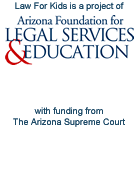 |

|
|
||||||||||||||||||||||||||||||||
|
|
||||||||||||||||||||||||||||||||
| Browse Questions | Search Questions | Ask a Question | Check the Status of Your Question |

|
|
||||||||||||||||||||||||||||||||||||||||||||||||||||||||||||||||||||||||||

| LFK Home | Speak Up! | Stories | Toons | Laws | Justice for All | Law Docs | Change It! | Games | Links |

 |
Disclaimer: The information contained in this site is made available
as a public service to the general public and is not intended to serve
as legal advice. You should consult a trained legal professional for
questions you may have about the laws affecting juveniles or any
legal interpretations.
Send Feedback regarding website content or to report bugs. Copyright © 1998 - 2024. Arizona Foundation for Legal Services & Education, All rights reserved Privacy Policy | Terms of use | Disclaimer | Contact Us |












